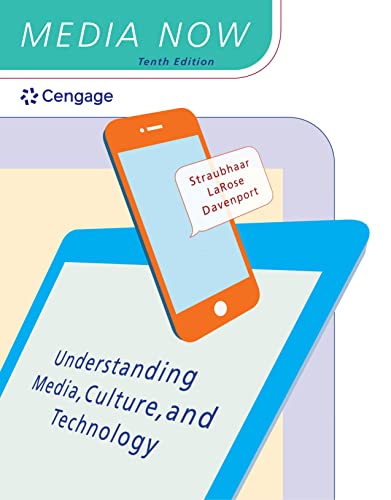
Media Now: Understanding Media, Culture, and Technology

Women influence the development of technology. The telephone was intended as an instrument of communication for the (male-dominated) business world, and telephone companies discouraged “trivial” social use of the telephone (mostly by women) to keep the lines clear for important (i.e., male-originated) business calls. However, women staged a quiet
... See moreJoseph Straubhaar • Media Now: Understanding Media, Culture, and Technology
the critical studies approach emphasizes the feedback link and an active process in which the human receiver “decodes” the messages that the human source encodes.
Joseph Straubhaar • Media Now: Understanding Media, Culture, and Technology
As commercial media reach into more societies, people in different parts of the world become aware of Coca-Cola and Nike shoes. That may undermine ties to their traditional cultures and spur the growth of consumer culture (Ewen, 2008). The danger is that commercial messages may impact our innermost desires and perceptions of ourselves, making us
... See moreJoseph Straubhaar • Media Now: Understanding Media, Culture, and Technology
Social media benefit from the critical mass or network effect (see below), by which their adoption, and hence their value, increases in relation to the number of users who have already adopted it.
Joseph Straubhaar • Media Now: Understanding Media, Culture, and Technology
we decide which innovations to pursue according to the expected outcomes of our adoption decision, and we then continually monitor the fulfillment of those expectations.
Joseph Straubhaar • Media Now: Understanding Media, Culture, and Technology
Citizens who can afford the price of an iPhone or iPad and have the skills to get information from the Internet can participate more fully in politics by accessing coverage of political issues and contributing their “tweets” to the ongoing public conversation.
Joseph Straubhaar • Media Now: Understanding Media, Culture, and Technology
The gatekeeping theory (Shoemaker, 1991; White, 1949) emphasizes the crucial role of the so-called gatekeepers, the media managers and editors who can either open or close “the gate” on a story or shape how it is presented. Gatekeepers are influential. They can squelch new ideas and suppress the news of events that others might find important.
Joseph Straubhaar • Media Now: Understanding Media, Culture, and Technology
McLuhan further theorized that in society’s zeal to conquer technology, we might progress in technology, but we would regress as a culture. Whereas technology could extend human capabilities in one way, it would cut off others. For example, the telephone would extend the voice, but amputate printed correspondence. These amputations could have
... See moreJoseph Straubhaar • Media Now: Understanding Media, Culture, and Technology
The case for archiva practice
Several factors contribute to such finely grained audience segmentation. First, information technologies, such as desktop publishing and computerized video editing, have lowered media production costs. That makes it possible to profit from smaller audiences. Second, advertisers value small audiences if they contain high proportions of their target
... See more